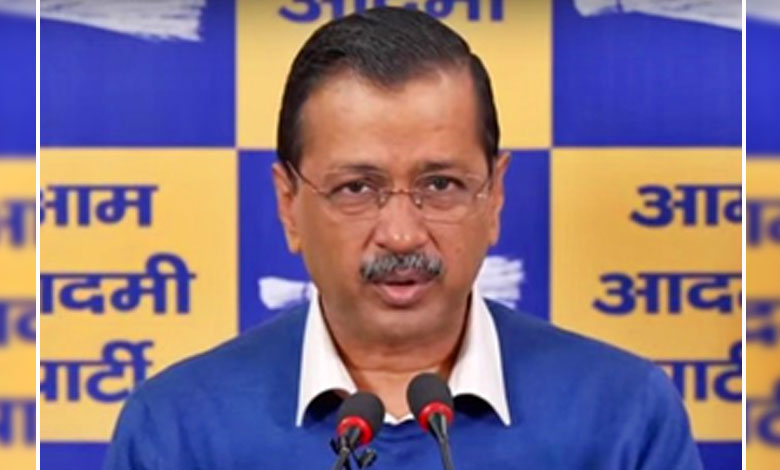Arvind Kejriwal Set to File Nomination for Delhi Assembly Election from New Delhi Constituency
Arvind Kejriwal is set to file his nomination for the Delhi Assembly election from the New Delhi constituency. His election campaign faces controversies amid corruption allegations.

New Delhi: In a significant development ahead of the upcoming Delhi Assembly elections, Arvind Kejriwal, the national convenor of the Aam Aadmi Party (AAP), is set to file his nomination for the New Delhi constituency on Wednesday, January 15.
Kejriwal, who is seeking re-election from the same constituency, has been a prominent figure in Delhi politics, leading the AAP to multiple victories in the past.
Table of Contents
His filing of nomination comes as the political heat intensifies with the Delhi elections just around the corner.
Kejriwal’s Election Campaign and Religious Offerings
Ahead of filing his nomination, Arvind Kejriwal shared his plans with his followers on social media. In a post on platform X (formerly Twitter), he expressed that several “mothers and sisters” from Delhi would accompany him to the election office to offer their blessings.
Kejriwal stated that he would first visit the Valmiki Temple and Hanuman Temple to seek divine blessings before submitting his nomination for the Delhi Assembly elections.
His decision to visit these temples signifies his effort to connect with the people of Delhi and strengthen his spiritual ties before beginning the official election process. This gesture is likely to resonate with his supporters, especially in a highly competitive and often emotionally charged election environment.
The Candidates in the New Delhi Constituency
In the New Delhi Assembly constituency, Kejriwal will face stiff competition. Parvesh Verma, a candidate from the Bharatiya Janata Party (BJP), is set to contest against him, while the Congress has fielded Sandeep Dikshit, the son of former Delhi Chief Minister Sheila Dikshit.
The triangular contest between AAP, BJP, and Congress in this constituency is expected to capture significant attention as it involves some of Delhi’s most influential political players.
Controversies Surrounding Kejriwal and AAP
Despite his growing support, Arvind Kejriwal and the AAP have faced significant controversies, especially in the run-up to the Delhi elections.
The Enforcement Directorate (ED) has been granted permission by the Union Home Ministry to prosecute Kejriwal in a money laundering case linked to the controversial excise policy for 2021-22.
This decision comes after an investigation into allegations that the South Group, a liquor cartel, bribed Kejriwal and AAP officials to influence the formulation of the excise policy.
Kejriwal, who is out on bail in the case, has vehemently denied the charges, accusing the BJP-led central government of using federal agencies to target and harass political opponents. He claims the allegations are politically motivated and intended to undermine his image ahead of the elections.
Also Read | Delhi CM Atishi Files Nomination for Kalkaji Assembly Seat
The Sheesh Mahal Row: Another Controversy for Kejriwal
Another issue that has emerged as a point of contention is the Sheesh Mahal row, in which Kejriwal has been accused of overspending on his official residence when he was Chief Minister of Delhi.
Critics argue that the extravagant spending on renovations at his residence contradicts the image of austerity that Kejriwal’s AAP project to the public.
This controversy has become one of the keys talking points for the opposition parties, particularly the BJP, as they target Kejriwal for alleged corruption and wastage of public funds.
The High-Stakes Delhi Assembly Election
The Delhi Assembly election, scheduled for February 5, 2025, is expected to be a highly contested and closely watched event. With 70 seats at stake, the election will determine the future of Delhi’s political landscape.
The AAP, which has been in power in the national capital for multiple terms, will be seeking to retain its dominance in the Delhi Assembly. On the other hand, both the BJP and Congress are hoping to capitalize on any political missteps by the ruling party to secure a win.
Electioneering in Delhi has reached a fever pitch, with all three major parties—AAP, BJP, and Congress—engaged in a war of words. Each party has been accusing the other of corruption, mismanagement, and failure to deliver on promises.
The ongoing election campaigns have thus far been marked by sharp political rhetoric, with leaders from all sides calling out their opponents on various issues.
Voting and Results: What to Expect
The election will take place on February 5, with the counting of votes scheduled for February 8. As the election draws closer, the political temperature in Delhi is expected to rise, with each party gearing up for the final push.
The outcome of the election will not only impact the political future of Arvind Kejriwal but also influence the political dynamics at the national level, as Delhi has historically been a key battleground for both regional and national parties.
